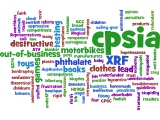
Given that nearly every member of Congress voted for CPSIA last year, it’s not surprising that that body of lawmakers was slow to respond to reports of the law’s catastrophic consequences. It’s beginning to happen now, though. Republicans have been in the lead, the latest sign being a strong letter from ranking House Commerce minority members Reps. George Radanovich (R-Calif.) and Joe Barton (R-Calif.) asking for a hearing. The motorcycle/powersports issue has also kindled widespread interest from Hill members (example: Rep. Michael Simpson, R-Idaho).
On March 4 there was a welcome break in the ice on the Democratic side as well. Rep. John Dingell (D-Mich.) sent a letter to the commissioners of the CPSC that, although cautiously worded, acknowledges many of the reports of calamitous consequences from around the country, something that his colleagues Rep. Henry Waxman (D-Calif.), Rep. Bobby Rush (D-Ill.) and Rep. Jan Schakowsky (D-Ill.) have been unwilling to do (when not dismissing those reports as based on misinformed or uninformed rumor). Of course, there is famously no love lost between Dingell and Waxman, who ousted him as Commerce chair. But Dingell’s stand could give cover for other Democrats to join in heeding the public outcry as legitimate. That letter in turn has prompted many CPSIA critics to write Dingell letters in hopes of arming him with more facts and arguments on the law’s ill effects: see in particular Rick Woldenberg and Wacky Hermit.
Waxman, for his part, has announced his intent to hold no hearing on the law until the Obama Administration installs a new chair at the Consumer Product Safety Commission. That serves the multiple functions of 1) stalling (while more small enterprises are driven out of business and thus are neutralized as political threats); 2) reinforcing the impression that the ball is in someone else’s court on addressing the law’s harms; 3) assisting in orchestrating whatever hearing is eventually held, since he expects an ally of his own to be installed as CPSC chair (the ultimate nightmare for CPSIA critics in that job would be someone like Pamela Gilbert, the class action lawyer, former plaintiff’s-lawyer lobbyist, and longtime Litigation Lobby figure who ran the Obama transition effort for the agency).
The membership of the House Energy and Commerce Committee, by the way, is listed here (hit “membership”; scroll to “Subcommittee on Commerce, Trade, and Consumer Protection” to find the members most directly involved). The membership of the Senate Commerce Committee is listed here and that of the Subcommittee on Consumer Protection, Product Safety and Insurance here.
Some miscellaneous weekend reading about the law: John Markley, Bureaucrash; Michael Maletic (Weil Gotshal & Manges), Republican National Lawyers Association; Ed Driscoll, Pajamas Media.
Public domain graphic: Grandma’s Graphics, Ruth Mary Hallock.
Filed under: CPSC, CPSIA, CPSIA and Congress, Henry Waxman, Jan Schakowsky, litigation lobby, PIRG, Public Citizen


